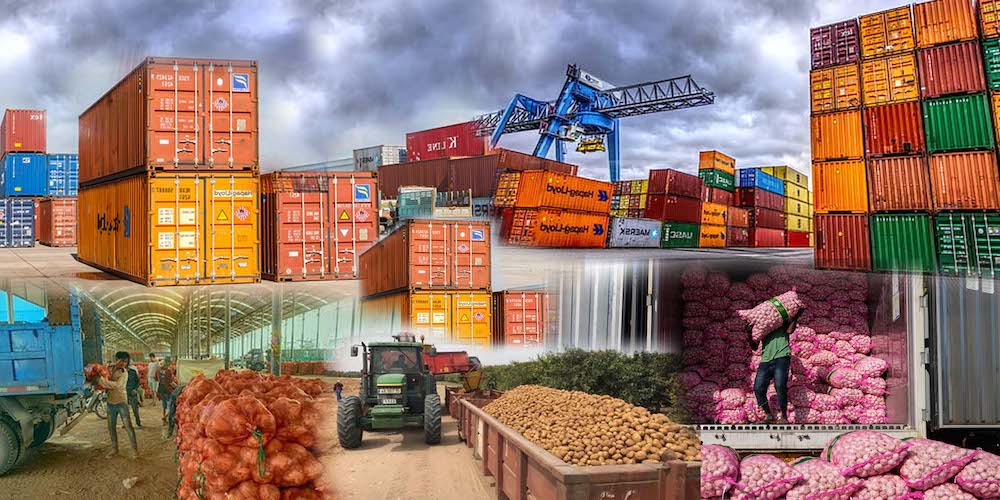Leveraging the Power of Cooperatives

National Co-operative Exports Limited is a national level multi-state co-operative dedicated to exports. It is an umbrella body that represents the entire co-operative sector of India in overseas markets. It is now taking India’s Cooperative Strength to World Markets
NCEL was approved by the Union Government and formally registered under the Multi-State Co-operative Societies Act, 2002 on 25 January 2023. It governs cooperative societies that operate across more than one state. It allows members to form cooperatives voluntarily and ensures they function democratically.
The Act promotes self-help, mutual aid, and the economic and social welfare of members. It also grants cooperatives functional autonomy and addresses related matters.
NCEL has been promoted by 5 leading co-operatives – Indian Farmers Fertiliser Co-operative Limited (IFFCO), Krishak Bharati Co-operative Limited (KRIBHCO), National Agricultural Co-operative Marketing Federation of India Limited (NAFED), Gujarat Co-operative Milk Marketing Federation (GCMMF–Amul) and the National Co-operative Development Corporation (NCDC).
Its initial paid-up capital is Rs.500 crore with contribution of Rs.100 crore each by the five promoters and authorised share capital is Rs.2,000 crore. By linking co-operative products to global markets, NCEL supports the “Make in India” vision, strengthens market linkages, and generates more employment opportunities in the co-operative sector.
NCEL aims to take surplus produce from Indian co-operatives to global markets, ensuring better demand and fair prices. It supports exports by handling procurement, storage, processing, packaging, branding, certification and marketing. Alongside this, it arranges finance, provides technical guidance, builds skills, develops market intelligence and links members with government schemes. In doing so, it strengthens the capacity of co-operatives and expands their presence in international trade. Through NCEL, the cooperative model has been scaled up to the national level, enabling local produce and skills to find markets across the globe under the guiding vision of “Sahakar se Samriddhi” — prosperity through co-operation.
From Inception to Impact
In a short span, NCEL has delivered significant results.
• By August 2025, 11,034 co-operatives have been granted membership, including 10,793 Primary Agricultural Credit Societies (PACS) and other cooperatives.
The number of cooperatives that have been granted membership are as under: –

• As of August 2025, Exports through NCEL have already crossed 13.49 lakh metric tonnes (LMT) of agricultural commodities worth Rs.5,403.01 crore including rice, fresh red onion, sugar, baby food, processed food, spices and tea.
• NCEL has expanded its exports to 28 countries, with key products being: basmati and non-basmati rice, marine products (especially shrimp), coarse cereals, wheat, fruits and vegetables, animal products, spices and plantation products.
• NCEL achieved a net profit of Rs.122 crore with a turnover of Rs.4,283 crore for 2024-25.
• During 2023-24, NCEL paid a 20% dividend to its member co-operatives. These achievements underscore NCEL’s potential to transform India’s co-operative movement into a global force.
• NCEL has also signed strategic agreements (MoUs) with 61 importers from Senegal, Indonesia and Nepal.

Key Targets
• Act as the nodal agency for co-operative exports and sign MoUs with state and UT-level bodies.
• Link stakeholders to global markets and create rural jobs through value addition, storage, packaging and transport.
• Promote exports of agricultural and allied commodities at internationally benchmarked prices.
• Provide market research, consultancy, training, certification support, logistics and infrastructure for co-operatives.
• Build a knowledge base and enhance branding, labelling and packaging to strengthen global positioning of co-operative products.
Strategies to Expand NCEL’s Reach and Market Presence
To meet the export targets, NCEL is adopting multiple strategies to strengthen its market position:
• Signed Memorandum of Understandings (MoUs) with state nodal agencies and framed business plans to connect with PACS.
• Launched a commodity seminar series to prepare farmers and cooperatives for exports, with the first held in Madhya Pradesh in July 2025.
• Adopted a ‘Whole of Government’ approach with nodal agencies, Registrar Cooperative Society offices and other stakeholders to design commodity-specific strategies.
• Strengthened branding and digital outreach through social media, marketing tools and awareness campaigns.
• Rolled out a BPO (Business Process Outsourcing) Outreach Programme to boost membership, especially from PACS.
• Enhanced engagement via Nukkad Natak programmes and a multilingual digital newsletter in 10 languages shared through the website and WhatsApp.
Future Directions for NCEL
Union Home Minister and Minister of Cooperation Amit Shah has urged NCEL to explore new export opportunities for sugar from co-operative sugar mills, aromatic rice from Tripura, organic cotton and coarse grains. He also highlighted the potential for partnerships with large companies to export fresh vegetables to Gulf countries and special potato varieties.
An ambitious target of ₹2 lakh crore exports has been set for NCEL. Shah directed that exports of all co-operative institutions should be routed through NCEL so that a turnover of about ₹20,000–30,000 crore and net profits can flow back to the co-operatives.
He also suggested setting up NCEL offices in Africa and Myanmar for pulses imports and developing a dedicated website to help co-operative members understand global demand and showcase their supply capacity.
Conclusion
National Co-operative Exports Limited represents a new era for India’s co-operative sector. In just two years, it has built a wide membership, exported millions of tonnes of produce, and shared profits with members. The next stage will involve scaling exports, diversifying the commodity basket, and deepening partnerships across the globe. With government support and a strong foundation built by its promoters, NCEL is poised to become the global face of India’s co-operatives.


